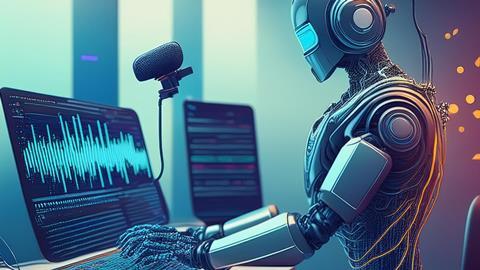Richard Wormwell at dock10 lays out the key strategic moves organisations should make to ensure AI doesn’t replace people, but amplifies them

AI didn’t arrive in 2022. What arrived was awareness. The journey began in 1950, when Alan Turing proposed the Turing Test. 73 years later, tools like ChatGPT brought AI into everyday creative and commercial workflows almost overnight. Within two months, it had 100 million users and now processes billions of prompts daily. For many, AI has already become the internet’s new front page. But despite the hype cycles, one thing is now clear: AI is no longer experimental. It’s essential.
In a recent sample of 500 creative companies, 60% use more than one AI tool, 76% say it has helped grow their business, 81% say it enables content they couldn’t make before, and 86% use generative AI in their workflows.
Ideation, generation, editing, and enhancement, this isn’t theoretical or futuristic – it’s happening now. And the narrative inside organisations is shifting.
From 2022’s curiosity to 2023’s anxiety, then 2024’s cautious optimism and 2025’s pragmatic acceleration, we’ve entered the era of AI as infrastructure – reliable, repeatable, and auditable.
But the real disruption isn’t technical — it’s social.
As AI handles more technical tasks, human judgment becomes more, not less valuable. Yet our workforce structures aren’t keeping pace.
The UK’s graduate population has risen from 25% in 2000 to 40% in 2025, yet high-skilled roles remain heavily concentrated in London. With house prices in the capital rising by 327% since 2000, many graduates are priced out of the very city where the jobs are.
Further to this, graduate vacancies have also collapsed, falling by two thirds since 2021. This has been attributed to two key factors – 22% of employers are cutting back due to rising employer NI contributions, while a further 15% of companies have said they are introducing AI instead of hiring entry-level staff.
Together, these forces are shrinking early-career opportunities and placing unprecedented strain on the talent pipeline. We’re producing more graduates than ever, but for jobs they can’t afford to move to, or that no longer exist.
To move forward, we must redefine AI as Augmented Intelligence, not Artificial Intelligence.
AI shouldn’t replace people, it should amplify them. The future belongs to organisations that make four strategic moves:
- Make AI Fluency Universal AI literacy must become part of every job description, not just technical roles. Teams should feel empowered to ask how AI can increase their productivity, improve collaboration, and free them to focus on strategic or creative work. Even simple tools such as AI note-takers already improve participation and accessibility.
- Don’t Wait for Universities to Catch Up A degree takes five years from design to graduation. Any curriculum written today will be outdated by the time students reach the workplace. Continuous, in-role learning is the only sustainable model. Organisations that treat training as optional will fall behind.
- Put Humans Back at the Centre AI will increasingly handle the process; humans must handle the purpose. That includes oversight, judgment, ethics, and context. Blanket AI bans don’t work, staff simply use AI without regulation. Controlled, domain-specific models represent a far better path.
- Widen the Talent Pool Beyond the Capital To future-proof the workforce, we must expand where and how we source talent. London can no longer be the default centre of gravity for high-skilled work. The UK’s regions hold an under tapped skills base shaped by strong universities, strong creative education, and increasingly remote-capable industries. Embracing hybrid work, regional innovation hubs, and distributed teams will not only relieve pressure on the London pipeline, but also unlock a broader, more diverse pool of talent. The organisations that thrive will be those willing to break geographic traditions and build teams around capability, not postcode.
Will we allow AI to hollow out the talent pipeline, or will we redesign our organisations to amplify human creativity, judgement, and purpose? The winners of the AI era won’t be those with the most powerful models but those that build the most powerful human–AI teams.

Richard Wormwell is head of innovation at dock10








No comments yet